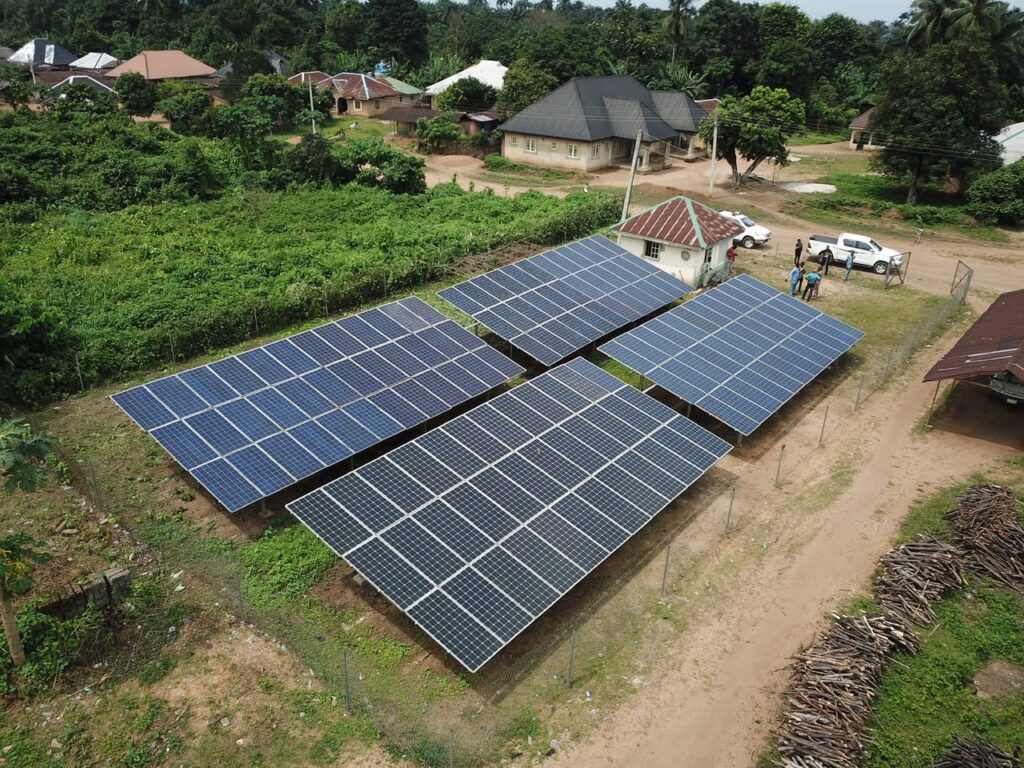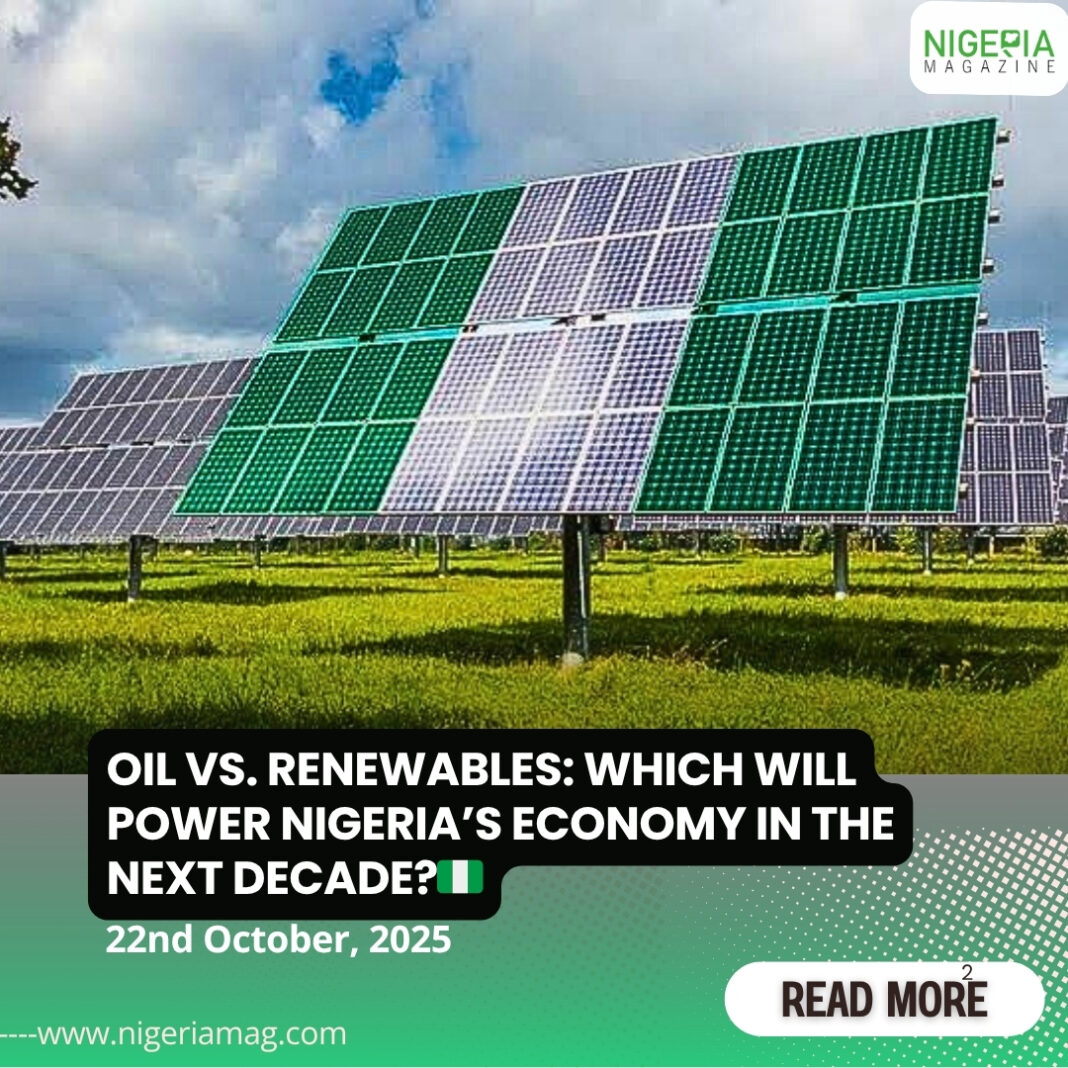Nigeria’s energy story is entering a decisive decade. The country still sits on vast hydrocarbon wealth, but policymakers and investors are increasingly asking whether oil will remain the engine of growth through the 2030s — or whether renewables (and gas as a bridge fuel) will take over. The short answer: both will matter, but their roles will change dramatically. Here’s why.
Oil — still dominant, but under pressure
Oil remains central to Nigeria’s public finances, foreign exchange earnings and industry. Crude production has bounced around in recent years — roughly around 1.4–1.6 million barrels per day in 2024–2025 — and the sector still contributes a large share of government revenues even as output faces operational, security and investment constraints. Official data and industry trackers show production falling from earlier highs and remaining below Nigeria’s OPEC quota at times. (OPEC)

Two structural changes matter. First, the commissioning of new downstream capacity — most notably the Dangote refinery — is reshaping domestic oil flows and product trade. Dangote’s 650,000 b/d refinery has already changed import patterns for petrol and diesel and is selectively reducing crude intake when market conditions warrant; the company has said temporary reductions in crude inflow were market-driven rather than due to technical failure. But the refinery still relies on steady crude supplies and faces security and logistics challenges — including reported sabotage incidents — that can ripple through domestic fuel availability. (Reuters)
Second, global oil markets are undergoing structural demand shifts. Major consuming countries are expanding electric vehicle fleets and energy efficiency measures; agencies such as the IEA expect demand growth to slow versus supply expansion from new producers — a factor that could keep prices volatile and compress long-term oil revenue for exporters. That environment raises fiscal risk for any producing country that remains overly dependent on oil receipts. (Reuters)
Renewables — rapid in the margins, but capital-constrained at scale
Renewables in Nigeria — chiefly solar and small hydro — are growing fastest at the edges: electrification via off-grid solar kits, commercial rooftop solutions, and mini-grids in underserved regions. These distributed solutions produce immediate social and economic benefits (lighting, refrigeration, telecoms) and reduce costly diesel use for businesses. Yet utility-scale renewable penetration on the national grid remains modest: installed solar capacity measured in low hundreds of megawatts, while the country’s theoretical hydro potential is large but underdeveloped. (ScienceDirect)
Policy signals are supportive. Nigeria’s Energy Transition Plan and related commitments aim to align the country with a net-zero-by-2060 pathway, and government roadmaps target substantially higher renewable shares in power generation through the 2020s into 2030. But turning targets into gigawatts requires huge capital, regulatory reform, grid upgrades and bankable offtake contracts. The Energy Transition Plan estimates that reaching net-zero will require roughly half a trillion dollars above business-as-usual spending — a scale of finance that will need private capital, multilateral lenders and innovative instruments. (energytransition.gov.ng)
Gas — the pragmatic bridge
For the next decade, natural gas looks like the pragmatic bridge between oil and renewables. Nigeria has major gas resources, and developers are progressing new LNG and domestic gas projects that can supply industry, power plants and petrochemical feedstocks. Recent approvals for offshore gas developments tied to LNG markets underscore private-sector willingness to invest in gas. Expanding gas-to-power and gas-for-industry can both lower diesel dependence and support a smoother, more affordable integration of variable renewables. (Reuters)
Who wins — scenarios for the 2026–2035 window
- Oil-led resilience (business-as-usual with refinery-driven domestic gains): If upstream investment recovers, security stabilizes, and domestic refining (Dangote and others) scales reliably, oil and refined products will continue to underpin Nigeria’s FX earnings and certain industrial uses. The economy would remain exposed to oil price cycles, but diesel and petrol import bills would shrink — improving trade balances in the near term. (Reuters)
- Gas + renewables transition (diversified growth): With stronger policy implementation, mobilized private finance and targeted reforms (transparent PPAs, distribution privatization, grid investments), gas ramps up for baseload and industry while renewables (particularly solar mini-grids and commercial solar) grow fast in distributed applications. This pathway lessens fiscal exposure to oil prices and unlocks broader electrification-led growth. (energytransition.gov.ng)
- Stalled transition (underinvestment in both): If governance, grid weaknesses and financing gaps persist, oil income could remain crucial but increasingly volatile, while renewables fail to scale — prolonging costly diesel dependence, energy poverty and missed industrial opportunities.
Investment, policy and market actions that will decide the outcome
- Scale private capital: Nigeria’s transition needs innovative finance blended with concessional capital to de-risk large renewable and gas projects. The Energy Transition Plan highlights the enormous capital gap. (Sustainable Energy for All | SEforALL)
- Make the grid investible: Clear, enforceable contracts and creditworthy off-takers are essential to attract utility-scale renewables and gas-fired capacity.
- Secure upstream and critical infrastructure: Protecting pipelines, refineries and gas assets from sabotage and theft reduces volatility that undermines investor confidence. Recent disruptions and the Dangote refinery’s operational concerns show how fragile supply chains can be. (Reuters)
- Support distributed solutions now: Off-grid solar, mini-grids and commercial PV deliver immediate economic returns and reduce diesel import bills while larger projects are built. (ScienceDirect)
Bottom line
Over the next decade Nigeria will not choose oil or renewables — it will depend on all three: oil for fiscal muscle and petrochemical value, gas as the dependable bridge, and renewables for rapid electrification and cost-competitive power at the margins. Which sector “powers” the economy most will hinge on policy follow-through, capital mobilisation and security of infrastructure. If Abuja and the private sector can marshal the necessary reforms and investment, the most likely outcome is a diversified energy mix that reduces oil’s fiscal dominance while preserving its role in export earnings and industry — a far healthier and more resilient economic trajectory for Nigeria. (energytransition.gov.ng)


